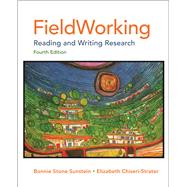
FieldWorking Reading and Writing Research
- ISBN13: 9780312622756
- ISBN10: 0312622759
- Edition: 4th
- Format: Paperback
- Copyright: 2011-09-02
- Publisher: Bedford/St. Martin's
Note: Supplemental materials are not guaranteed with Rental or Used book purchases.
-
Your order must be $35 or more to qualify for free economy shipping. Bulk sales, PO's, Marketplace items, eBooks and apparel do not qualify for this offer.








